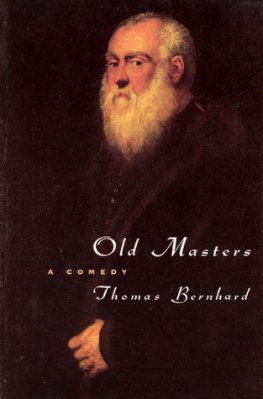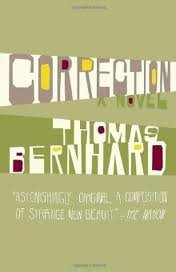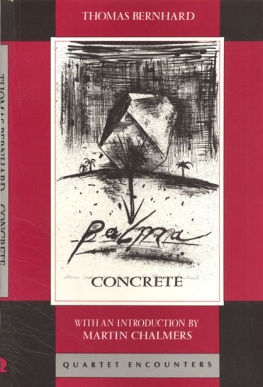Thomas Bernhard - Gargoyles
Here you can read online Thomas Bernhard - Gargoyles full text of the book (entire story) in english for free. Download pdf and epub, get meaning, cover and reviews about this ebook. year: 2006, publisher: Vintage International, genre: Art. Description of the work, (preface) as well as reviews are available. Best literature library LitArk.com created for fans of good reading and offers a wide selection of genres:
Romance novel
Science fiction
Adventure
Detective
Science
History
Home and family
Prose
Art
Politics
Computer
Non-fiction
Religion
Business
Children
Humor
Choose a favorite category and find really read worthwhile books. Enjoy immersion in the world of imagination, feel the emotions of the characters or learn something new for yourself, make an fascinating discovery.

- Book:Gargoyles
- Author:
- Publisher:Vintage International
- Genre:
- Year:2006
- Rating:4 / 5
- Favourites:Add to favourites
- Your mark:
- 80
- 1
- 2
- 3
- 4
- 5
Gargoyles: summary, description and annotation
We offer to read an annotation, description, summary or preface (depends on what the author of the book "Gargoyles" wrote himself). If you haven't found the necessary information about the book — write in the comments, we will try to find it.
Gargoyles — read online for free the complete book (whole text) full work
Below is the text of the book, divided by pages. System saving the place of the last page read, allows you to conveniently read the book "Gargoyles" online for free, without having to search again every time where you left off. Put a bookmark, and you can go to the page where you finished reading at any time.
Font size:
Interval:
Bookmark:
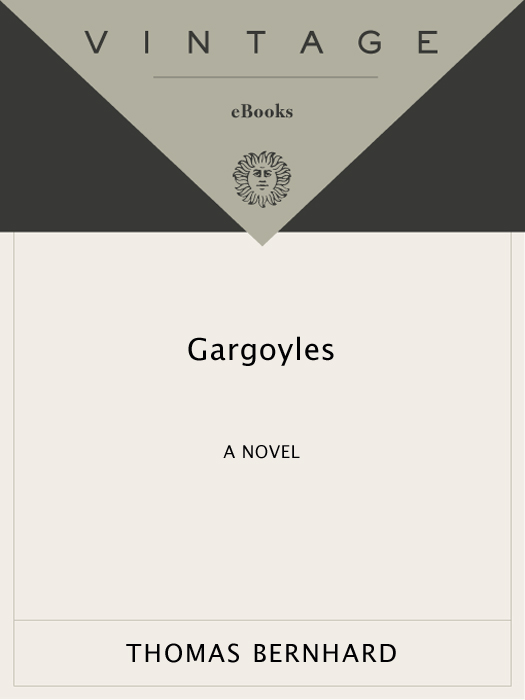
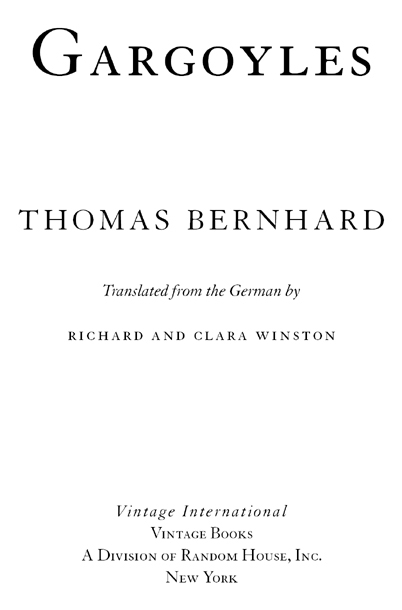

FIRST VINTAGE INTERNATIONAL EDITION, OCTOBER 2006
Copyright 1970 by Alfred A. Knopf, a division of Random House, Inc.
All rights reserved. Published in the United States by Vintage Books, a division of Random House, Inc., New York, and in Canada by Random House of Canada Limited, Toronto. Originally published in German as Verstrung by Insel Verlag, Frankfurt.
Copyright 1967 by Insel Verlag, Frankfurt am Main. This translation originally published in hardcover in the United States by Alfred A. Knopf, Inc., New York, in 1970.
Vintage is a registered trademark and Vintage International and colophon are trademarks of Random House, Inc.
This is a work of fiction. Names, characters, places, and incidents either are the product of the authors imagination or are used fictitiously. Any resemblance to actual persons, living or dead, events, or locales is entirely coincidental.
The Library of Congress has cataloged the Knopf edition as follows:
Bernhard, Thomas.
[Verstrung. English]
Gargoyles. Translated from the German by Richard and Clara Winston.1st American ed.
p. cm.
PZ4.B5248 Gar PT2662.E7
833.914 70106630
eISBN: 978-0-307-77347-0
www.vintagebooks.com
v3.1
The enternal silence of these infinite spaces terrifies me.
P ASCAL , Pense 206
ON the twenty-sixth my father drove off to Salla at two oclock in the morning to see to a schoolteacher whom he found dying and left dead. From there he set out toward Hllberg to treat a child who had fallen into a hog tub full of boiling water that spring. Discharged from the hospital weeks ago, it was now back with its parents.
He liked seeing the child, and dropped by there whenever he could. The parents were simple people, the father a miner in Kflach, the mother a servant in a butchers household in Voitsberg. But the child was not left alone all day; it was in the care of one of the mothers sisters. On this day my father described the child to me in greater detail than ever before, adding that he was afraid it had only a short time to live. I can say for a certainty that it wont last through the winter, so I am going to see it as often as possible now, he said. It struck me that he spoke of the child as a beloved person, very quietly and without having to consider his words. He let himself express a natural affection for the child as he hinted at the surroundings in which the child had grown up, not so much reared as guarded by its parents, and explained his speculations about these parents and their relationship to the child by filling out the details of the environment. While he spoke, he paced back and forth in his room, and soon no longer had the slightest need to lie down again.
My father was the only doctor in a relatively large and difficult district, now that the other doctor had moved to Graz, where he had accepted a teaching post at the university. The chance of a replacement, my father said, is practically nil. A man would be mad to want to start a practice here. For his own part, he said, he was used to sacrificing himself to a sick populace given to violence as well as insanity. My being home for the weekend was a tranquilizer for him, he said, and one that was more and more necessary. He seemed tired. But when I threw open the shutters and the light from the Ache river dazzled us, he said he would take a walk. Come, he said, come along. While I was dressing, he talked about a phenomenon of nature, a chestnut tree that had burst into blossom now, at the end of September. He had discovered it by the riverside beyond the village. This would be a good opportunity, he said, for us to discuss something he had long wanted to talk about. Probably, I thought, something connected with my studies in Leoben, something to do with mining. This was the right time for it, he said, before he was taken up with the days quota of patients. You know, he said, often its all too much for me.
We did not want to wake my sister, and went out to the vestibule for our coats as quietly as possible. But as we were about to leave the house, the bell rang. At the door stood someone I did not know, who turned out to be an innkeeper from Gradenberg. He asked my father to come with him at once.
And so we rode to Gradenberg in the innkeepers wagon instead of strolling along the Ache and having our discussion. There was no more talk about the flowering chestnut tree. Instead we heard a most unsettling tale about the innkeepers wife.
She had been busy until two oclock in the morning, her husband said, serving miners who had already been drunk for several hours and had divided into two hostile groups. Suddenly one of the miners without the slightest provocation struck her on the head, and she had dropped unconscious to the floor. The horrified miners carried her up to the bedroom on the second floor of the inn, her head bumping several times against the banister, and deposited her on her bed. Her husband woke up when the miners opened the bedroom door, and listened, dazed from sleep, to an account of the incident. The suddenly sobered miners wanted him to go to the police and lodge a complaint at once, that very night, against the assailant, a man named Grssl, who had run off but whom they all could identify. The police, including the constable supposedly on duty, had all been asleep, the innkeeper said. But by showering the police station windows with pebbles he had finally roused someone and been admitted. At first the police had advised him to come back in the forenoon to make a statement for the record, but he had insisted that the statement be recorded right then and there, and demanded that some of the constables at least come to the inn with him because his wife was lying there unconscious, the miners were still waiting, and he felt that they, too, should present their statements without delay. But the whole thing had taken too long; by the time he returned to the inn with two of the constables, all the miners except one were gone. His first thought was that he should not have left his wife alone for a moment, for as he entered the bedroom and saw the miner Kolig, who had been there all this time, the most horrible suspicions and imaginings ran through his mind. He did not know the man at all well, was acquainted with him merely from his occasional visits to the inn, and did not regard him as a neighbor in the sense of his being trustworthy. Moreover the miner spoke a Styrian dialect unpleasantly different from the dialect of the vicinity.
Albert Kolig was so drunk that though still on his feet he could not speak even the shortest sentence. The younger of the constables promptly told him to sit down in the armchair in the corner and began questioning him, while the other constable took pictures of the woman lying on the bed as motionless as if she were a corpse. The answers Kolig gave for the record were in fact useless. He could not sit up and was on the point of keeling over when the constable, losing patience, pulled him up and yanked and shoved him out into the hall.
The culprit, Grssl, was reputed to be the kind of man who the moment he entered a tavern was bound to stay until he had made some kind of ruckus. The constables said that it would not be difficult to find him and in view of his previous convictions the chances were that he would be in for a sentence of several years, since the facts of the case were plain enough: The blow on the womans head had evidently caused a severe injury, for otherwise she would not be still unconscious. As soon as the older constable spoke the words severe injury, everyone realized that a doctor would have to be called. Meanwhile several hours have passed, the innkeeper said.
Font size:
Interval:
Bookmark:
Similar books «Gargoyles»
Look at similar books to Gargoyles. We have selected literature similar in name and meaning in the hope of providing readers with more options to find new, interesting, not yet read works.
Discussion, reviews of the book Gargoyles and just readers' own opinions. Leave your comments, write what you think about the work, its meaning or the main characters. Specify what exactly you liked and what you didn't like, and why you think so.

